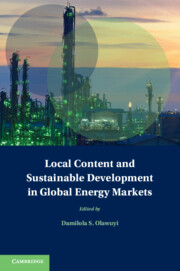Refine search
Actions for selected content:
8 results
4 - Data as Speech and Expression
- from Part II - Driving Datafication
-
- Book:
- International Economic Law in the Era of Datafication
- Published online:
- 28 March 2024
- Print publication:
- 04 April 2024, pp 108-142
-
- Chapter
-
- You have access
- Open access
- HTML
- Export citation
The First Ten Years of WTO Jurisprudence on Renewable Energy Support Measures: Has the Dust Settled Yet?
-
- Journal:
- World Trade Review / Volume 21 / Issue 4 / October 2022
- Published online by Cambridge University Press:
- 18 July 2022, pp. 455-478
- Print publication:
- October 2022
-
- Article
-
- You have access
- Open access
- HTML
- Export citation
Local Content Requirements in Nigeria's Extractive Sector and the Implications for Sustainable Development
-
- Journal:
- Journal of African Law / Volume 66 / Issue 1 / February 2022
- Published online by Cambridge University Press:
- 27 December 2021, pp. 73-96
- Print publication:
- February 2022
-
- Article
-
- You have access
- Open access
- HTML
- Export citation
Nihil novi sub sole: The Need for Rethinking WTO and Green Subsidies in Light of United States – Renewable Energy
-
- Journal:
- World Trade Review / Volume 20 / Issue 4 / October 2021
- Published online by Cambridge University Press:
- 22 June 2021, pp. 491-508
- Print publication:
- October 2021
-
- Article
- Export citation

Local Content and Sustainable Development in Global Energy Markets
-
- Published online:
- 05 March 2021
- Print publication:
- 04 March 2021
3 - States, Markets, and Energy Transition: Good Industrial Policy?
-
- Book:
- Political Economies of Energy Transition
- Published online:
- 12 November 2020
- Print publication:
- 26 November 2020, pp 79-131
-
- Chapter
- Export citation
Part I - Multidisciplinary Perspectives
-
- Book:
- In Search of Good Energy Policy
- Published online:
- 10 June 2019
- Print publication:
- 20 June 2019, pp 23-98
-
- Chapter
- Export citation
9 - Legal Aspects of Energy Policy
- from Part I - Multidisciplinary Perspectives
-
-
- Book:
- In Search of Good Energy Policy
- Published online:
- 10 June 2019
- Print publication:
- 20 June 2019, pp 89-98
-
- Chapter
- Export citation
